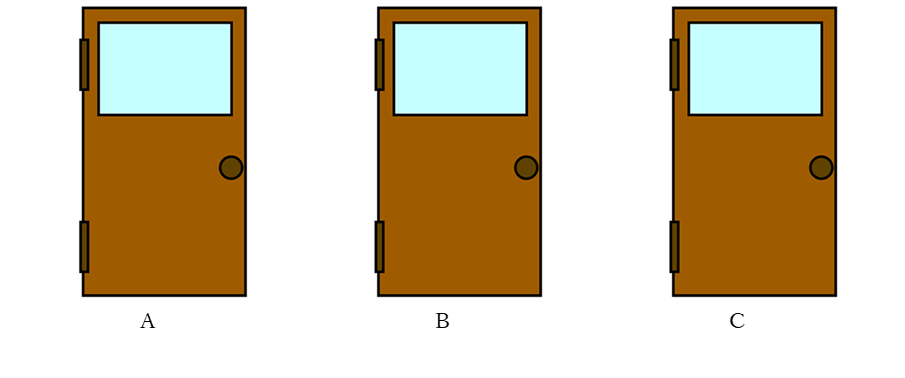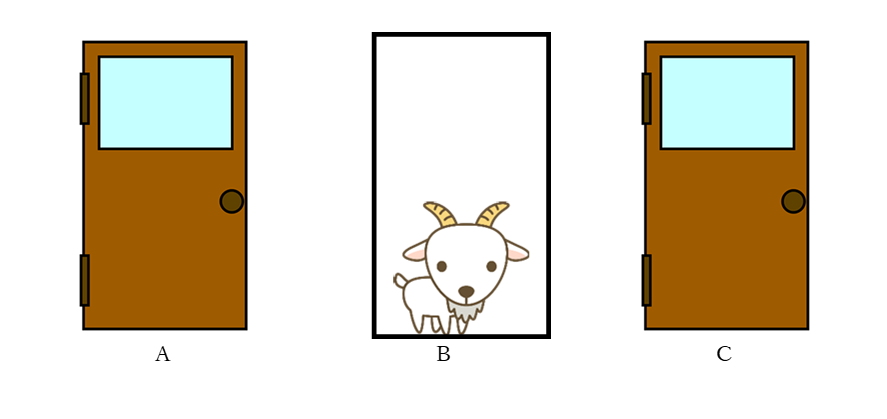モンティ・ホールの問題
今回は、単純なクイズです。Monty Hallが司会者を務めるアメリカのショー番組で行われたゲームに関する問題。ゲームのルールは次の通り。
- 3つのドアがある。プレイヤーは一人。

2.ドアにはヤギ、ヤギ、車(賞品)がランダムに入っている。

- プレイヤーがドアを1つ選択する(仮にAを選択したとする) 。
- モンティは残りの2つのドアB,Cのうち1つを必ず開ける。
- モンティが開けるドアには必ずヤギが入っている。
- モンティはプレイヤーにドアの選択を変更するかどうかを尋ねる。
 というもの。さて、あなたがプレイヤーだったら、ドアの選択を変更しますか。答えと解説は次回。
というもの。さて、あなたがプレイヤーだったら、ドアの選択を変更しますか。答えと解説は次回。
All Humans are Siblings?!
Today`s topic will be elementary mathematics. No matter who you are, you have a mother and a father. Consequently, one generation back, you have two ancestors. The mother and father each have their own mother and father, respectively. So you have two grandpas and two grandmas, giving you 4 people when going 2 generations back. Taking that in, it is apparent that for every generation back you go, the number is multiplied by 2. By this math, going 3 generations back gives you 8 more people, 4 back gives you 16, and 5 back gives you 32. Assuming that each generation is about 25 years, going 5 generations back puts us bout 125 years ago, somewhere around 1900, right around the time of the Sino-Japanese and Russo-Japanese war. Jumping a little further back ten generations (250 years about, or 1780, the middle of the Edo period) would give us 1024 ancestors.
Let`s take a break here. Even now, people who boast that “My ancestors were great samurai!” are still sometimes around. However, if during the Edo period you had 1000 ancestors, you may have some great people within that number, but you also probably have people from many walks of life. Taking this into perspective, is it not best to put any bragging about your ancestors on hold?
Now, if you will, let`s get back into making some calculations. 20 generations back (500 years ago or 1520, during the Sengoku (Warring States) period) gives us about one million ancestors. 30 generations back (750 years ago or 1270, the Kamakura period) gives us around 1 billion ancestors. The population in Japan at this time is estimated at around a few million people, so clearly, something is off here. What`s happening is that we are counting common ancestors if they are unique people. This would become an even bigger contradiction if we tried to assume people did not have common ancestors. If you go back more than 20 generations, at the very least, if you look at a small village, town, or city with much interaction among the inhabitants, you will find many populations of relatives.
In the past, unlike today, transportation was not as well developed; if we are talking about the Edo period, contact between different clans was limited, not to mention contact between different territories. However, according to the results of DNA analysis, we Homo sapiens all come from a single woman in Botswana located in Southern Africa, about 200,000 years ago. What would she think if she saw her descendants fighting, or in the worst case, killing one another? All humans are siblings.
[1] Nature 575 (2019) 185-189
Dictionary Samadhi (7月5日投稿記事「辞書三昧」の英訳)
Throughout junior and high school, I received English tutoring from a teacher I will refer to as M. I was told by an upperclassman of 2 years that “M is a really great teacher! It`s best to just write down everything he says without leaving out anything.”, so that`s what I did. Thanks to that, I learned a lot. “Finding a good dictionary and consulting it often is the key to mastering a language. If you find it too much of a pain to consult a dictionary, then you won`t get results. It`s common for a single word to have many meanings. Therefore, it`s obvious to look up a word you don`t know but repeatedly look up a word you think you know in that dictionary.” This is one thing M said that I can`t forget.
M recommended the Kenkyusha`s New Collegiate English-Japanese Dictionary (hereafter referred to as the Kenkyusha dictionary), which had just received its initial pressing. I`m sure many know this, but English verbs have a grammatical rule called verb patterns, and depending on the verb, the verb pattern is decided. For example, for the verb describe, a native speaker can`t just get the syntax that includes “describe that...”. Americans or the English have many verb patterns engrained in their heads already, but for a Japanese person, you have to consult a dictionary repeatedly. In the Kenkyusha dictionary, every verb pattern that can be applied to a verb is listed, which is indispensable for writing in English. Nowadays, the English-Japanese dictionaries used for study in circulation have the verb patterns of each of the verbs, but at that time, the Kenkyusha dictionary I used was a pioneer in this aspect. Further, noun patterns and adjective patterns are also described. Again I must thank M`s keen eye and guidance.
On the other hand, when reading something written in English, or translating from English to Japanese, a dictionary abundant in word count and translations is of great use. However, being numerous in examples and being abundant in word count is a difficult coexistence when dealing with a limited number of pages. Accordingly, for an English-Japanese dictionary, you need both one rich in examples, and one high in word count, at the bare minimum.
Nowadays, I put my Oxford Advanced Learner’s Dictionary (OALD) to loving use. Suppose I can`t find a translation for a word that exactly fits what I`m looking for in my English-Japanese dictionaries. In that case, I use the OALD to understand the meanings that can be applied to the word and try to figure out a translation that fits the context. I have been helped out of a pinch countless times by using this strategy. It also has many examples, and of course, sentence patterns are properly explained. As a native co-worker said,” The Oxford dictionary is the golden standard.”
Through this way of thinking, I have become very familiar with many dictionaries. Each of them having its own characteristics makes reading through them for comparison quite interesting. Surely this is what you can call “Dictionary Samadhi”! However, due to being at an older age, reading small font can tire me out. Due to that, I am thankful for electronic dictionaries and being able to install them on a computer as well. Net dictionaries are convenient, but relying solely on them limits the scope of your translations. In parting, I would like to rest my pen on the words of M: “The price of a dictionary might get a little steep, but if you think of the extent of work put into compiling it and what you can learn from studying it, it`s quite cheap for what it`s worth. You can`t be frugal with what you spend on a dictionary”.
Let's not talk about the Supernatural (7月4日投稿記事「怪力乱神を語らず」の英訳)
For as long as I can remember, I, just like everyone else, was interested in things like Shinto, Buddhism, spirits, and the afterlife. You can't see or touch Gods or Buddha or spirits. As far as the afterlife, I haven't been, and deceased people don't come back, so there is no way to understand it. There is extensive literature on the subject, but I don't put much weight on it. From the perspective of physics or chemistry, if spirits have consciousness and the ability to hear and see or are active in the physical world, where does the energy essential for all of this come from? If there are conscious spirits after death, will those who suffer from Alzheimer's or lost their memory, judgment, or motor skills recover their memory after death? If you could restore all the memories from when you were in good health after death, why can't you do that while you're still living? Thinking from this perspective, when we pass, aren't we like computers after they have been shut down, losing our consciousness, memory, senses, and judgment? However, in the end, to try to think of it as if it has proof for a scientific foundation or not is a bit of a fruitless endeavor no matter how long you ponder it.
To try to understand everything about the world from a scientific perspective may be a bit of an overestimation of the field. For example, the universe is explained as created by the big bang. Concerning the ultra-high temperature and density involved with the big bang, there are details that we can't clarify since they lie outside the scope of our currently known physical laws. When I look up at the starry sky at night and realize all of the intricate workings of life, I find myself at a loss for words. The world working with some things nobody can explain is acceptable. There's a saying by Confucius: "True knowledge is a clear distinction between what one knows and what one does not know." In the same way, Confucius suggests that supernatural, mysterious events or existences are best not related to others.
People hope to have the chance to be reunited with their beloved relatives, partners, and friends who may have passed away from illness or misfortunes. You wouldn't argue with them that there is no afterlife without any ground. You just can't say it. The idea that they can see their loved ones in the afterlife is full of the stuff of dreams, and a wonderful one at that.
人類はみな兄弟?!
今回は初等数学の話題。だれにも父親と母親が一人ずついる。したがって1世代前には2人の先祖がいる。父親と母親それぞれに父親と母親がいる。おじいさんとおばあさんは二人ずつ、つまり2世代前は、4人。ということは、1世代遡るたびに数が2倍に増える。そうすると、3世代前は8人、4世代前は16人、5世代前は32人。1世代は25年と仮定すると、これは、125年前、1900年ごろ。日清日露戦争の頃だ。ちょっと飛ばして、10世代前(250年前、1770年、江戸時代中期)のご先祖の数は1024人ということになる。
ここで一息。いまなお、「我が家の先祖は武家で。。。」というような自慢話をする人がたまにいる。しかし、江戸時代に、1000人ほどのご先祖がいらっしゃれば、なかには立派なお方もいたかもしれないが、いろんな人がいたかもしれない。そうすると先祖の自慢話をするのは、止めたほうが良いのではないか。
ふたたび計算にお付き合いください。20世代前(500年前、1520年、戦国時代)は約百万人、30世代前(750年前、1270年、鎌倉時代)は、約10億人となる。この頃の日本の人口は、数百万人であるから、明らかにどこかおかしい。共通の先祖をだぶって数えている、ということだ。現代人の任意の二人に、共通の祖先がいないとすると、この矛盾はさらに大きくなる。20世代以上前に遡れば、少なくとも、住民の間で交流のある小さな村、町、郡に限れば、そこら中親戚だらけということになる。
昔は、今のように交通機関は発達していないし、江戸時代でいうと、藩をまたがった交流は限られていたようだし、ましてや国境をまたがった交流はさらに限られていた。しかし、遺伝子解析の結果によると、我々ホモ・サピエンスは、約20万年前アフリカ南部ボツワナに住んでいた一人の女性が共通の祖先であるという。[1]いがみ合ったり、ひどい場合には殺しあったりする子孫を彼女が見たとして、どう思うだろう。人類はみな兄弟。
[1] 人類の故郷はアフリカ南部ボツワナの湿地帯…最新の研究で新説 (Nature 575 (2019) 185-189)
辞書三昧
中学高校時代を通じて、M先生に英語のご指導を受けた。2級上の先輩に、「M先生はとても良い先生だ。M先生の言うことは聞き流さずに全部ノートをとった方がいい」と教えられ、そのとおり実行した。おかげでとても勉強になった。「良い辞書を選んで、まめに引くことが、語学上達の秘訣だ。辞書を引く労を惜しむようでは、何事も成就しない。単語には複数の語義があるのは普通だから、知らない単語はもちろん、知っていると思っている単語こそ何度も辞書で引け」というM先生の言葉は忘れられない。
M先生に、初版が発売されたばかりの研究社新英和中辞典(以下、中辞典)を勧められた。ご存じの方も多いと思うが、英語の動詞には、動詞型(Verb Pattern)という語法のルールがあり、動詞によってとれる動詞型が決まっている。たとえば、describe(記述する)という動詞は、describe that…という構文をとらない。英米人は、それぞれの動詞の取りうる動詞型が頭の中に入っているが、日本人はまめに辞書を引かざるを得ない。中辞典には、動詞すべてに対してその動詞のとれる動詞型と用例が明記してあって、英語を書くのに不可欠だ。現在出回っている学習英和辞典の多くには、それぞれの動詞の取りうる動詞型が明記されているが、この点、中辞典は当時の学習英和辞典としては先駆的な辞典であった。また、名詞型や形容詞型の記述もある。あらためてM先生の慧眼とご指導に感謝する。
一方で、英文を読むときや、英語を日本語に翻訳するときは、収録語数や訳語が豊富な辞書が重宝する。しかしながら、用例が豊富であるのと、収録語数が豊富なのとは、ページ数の制限で両立が難しい。したがって、英和辞典としては、用例が豊富な辞書と、収録語数が豊富な辞書の2種類が最低必要になる。
私はOxford Advanced Learner’s Dictionary (OALD)を愛用している。英和辞典でピッタリあてはまる訳語が見つけられない場合には、OALDで単語の意味を理解し、文脈に沿った訳語を自分で考える。これで助かったことは何度もある。用例も豊富だし、もちろん文型の解説もしっかりしている。Nativeの同僚曰く、”The Oxford dictionary is the golden standard.”(オックスフォードの辞書は、最高です)
そういうわけで多数の辞書のお世話になっている。それぞれに特徴があり、比べて読むのは楽しい。まさに辞書三昧だ。しかし老眼のため細かい字を読むのは疲れる。その点、電子辞書やパソコンにインストールできる辞書はありがたい。ネットの辞書も便利だが、ネットの辞書だけに頼ると訳語の範囲が限られてくる。最後に、「辞書は値段が少々張るかもしれないが、辞書編纂の労苦や、辞書から学べる内容を考えれば、安い買い物だ。辞書に支払う位のお金を惜しんではいけない。」というM先生の言葉を紹介して筆を擱く。
怪力乱神を語らず
ものごころついたころから、人並みに、神仏や霊魂や来世には興味があった。神仏や霊魂は見たり触ったりできない。来世については、行ったことがないし、死んだ人は戻ってこないから、分かりようがない。これらについての書物はあまたあるが、どうも納得がいかない。物理や化学をかじってからは、「霊魂が意識を持って見たり聞いたりあるいは何らかの行為をするとして、そのために必要なエネルギーはどうするのだろう」と考えたり、「霊魂があって、死後も意識があるのならば、アルツハイマーを患って、記憶や判断力がなくなった人が亡くなった後、記憶は無くなったままなのだろうか。もし死後の意識が、健康な時の記憶を取り戻せるのであれば、生前にどうしてその記憶を取り戻せないのであろうか。そう考えると、電源を切った後のパソコンのように、死後は意識も記憶も感覚も判断力もなくなるのではないだろうか。」などと考えたこともあった。しかし、結局、科学的な根拠や確たる証拠がないことは、あるのかないのかなどと、いくら考えてもしかたがない、妄想のたぐいではないか。
世の中のことがすべて科学で理解できるというのは、かいかぶりすぎなのではないか。例えば、宇宙は、ビッグバンで始まったとされている。ビッグバンの超高温超高密度では、現在わかっている物理法則の適用の範囲外で、詳しいことは解明できないという。夜空に輝く無数の星々を眺めたとき、あるいは生命の精妙な営みを知ったとき、言葉を失う。この世の中には説明できないことがあってもよいのではないか。論語に「これを知るをこれを知ると為し、知らざるを知らずと為す。是れ知るなり。」[1]とある。また、「怪力乱神を語らず」[2]とも。不思議な現象や存在については語らないほうがよい。
病気や災害などで愛する肉親やパートナーや友人を亡くした人たちは、死後に再会できることに望みをつないでいる。そのような方々に、大した根拠もなく、来世などない、などとはどうしても言えない。言ってはいけない。愛する人に死後再会できる、と考えることは夢があって、とても素敵だ。
[2] 「子怪力乱神を語らず」「怪」は尋常でないこと、「力」は力の強いこと、「乱」は道理に背いて社会を乱すこと、「神」は神妙不可思議なこと。人知で推しはかれず、理性では説明できないこと。論語(述而) [広辞苑 第七版]